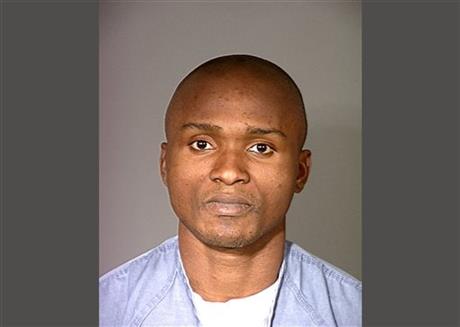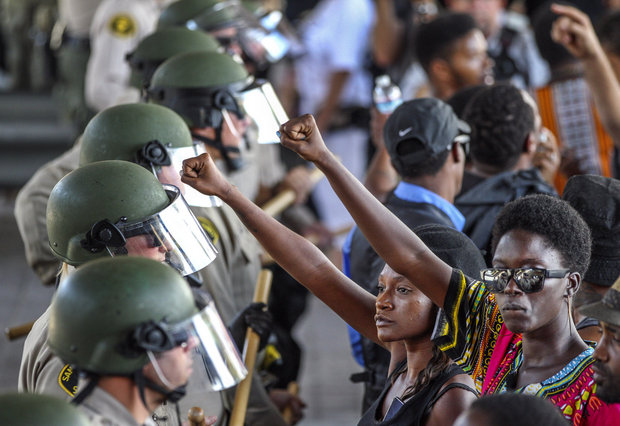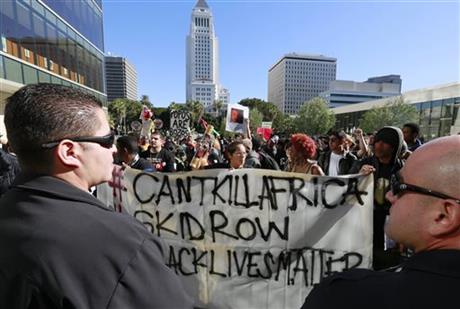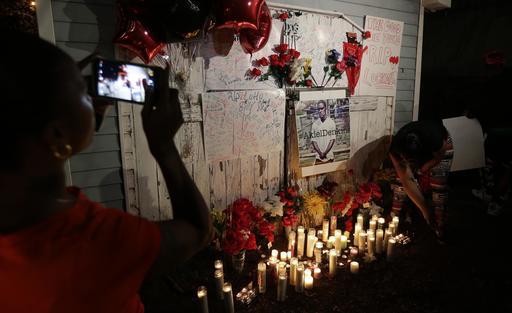

LOS ANGELES (AP) — For months before he was fatally shot by police, a man walked the streets of Los Angeles’ Skid Row, with few or no one he encountered knowing anything about his past bank robbery conviction, his wanted probation status or that even the false name he lived under had been purloined from a Frenchman years earlier.
As those details were revealed Tuesday, more questions emerged about the man and his still-murky identity, including how he fell through so many cracks and ended up among downtown’s homeless, where millions would watch his death in a videotaped struggle.
A law enforcement official identified the man police shot Sunday as Charley Saturmin Robinet, 39. The official wasn’t authorized to speak publicly and talked to The Associated Press on the condition of anonymity.
But Axel Cruau, the consul general for France in Los Angeles, said the man stole the identity of a French citizen and was living in the United States under an assumed name. He had applied for a French passport in the late 1990s to come to the United States to pursue an acting career.
“The real Charley Robinet is in France apparently living a totally normal life and totally unaware his identity had been stolen years and years ago,” Cruau said.
Using that name, the man was identified as a French national in 2000 when he was convicted of robbing a Wells Fargo branch and pistol-whipping an employee in an effort to pay for acting classes at the Beverly Hills Playhouse.
That arrest spurred the consulate to provide the man with support, but as he was nearing his release from prison in 2013, officials found another Robinet in France with the same birthdate and discovered the one in the U.S. was an impostor, Cruau said.
While in federal prison in Rochester, Minnesota, the bank robber known as Robinet was assigned to the mental health unit, and federal officials said medical staff determined he had “a mental disease or defect” that required treatment in a psychiatric hospital, documents show.
He served roughly 13 years in prison and then spent six months in a halfway house before being released in May 2014, said Ed Ross, a spokesman for the Bureau of Prisons.
Foreign nationals are typically deported after serving criminal sentences. But in this case, France would not take the man because he wasn’t really a French citizen. The U.S. Supreme Court ruled in 2001 that immigration authorities could not detain people indefinitely because no country is willing to take them. So once his sentence was served, the man known as Robinet was apparently set free.
U.S. Immigration and Customs Enforcement spokeswoman Virginia Kice said she couldn’t immediately comment on his immigration history.
Under the terms of the man’s release, he was required to provide reports to his probation officer at the beginning of each month, Deputy U.S. Marshal Matthew Cordova said. When he failed to do so in November, December and January, a federal warrant was issued Jan. 9.
U.S. probation officials did not respond to repeated requests for comment Tuesday, and it was unclear what efforts they made to find the man.
Leaders at Union Rescue Mission on Skid Row said he’d been living on the sidewalk outside their shelter for six to eight months.
The confrontation that ended in the man’s death Sunday was recorded on a bystander’s cellphone and viewed millions of times online. Authorities said the man tried to grab a rookie officer’s gun before three other officers shot him.
Several dozen people rallied Tuesday in protest of the shooting and observed a moment of silence.
Though the shooting was captured on multiple videos and two officer-worn cameras, exactly what happened remains unclear.
Video showed the homeless man reaching toward a rookie officer’s waistband, police Chief Charlie Beck said. The officer’s gun was later found partly cocked and jammed with a round of ammunition in the chamber and another in the ejection port, indicating a struggle for the weapon, the chief said.
The three other officers then opened fire.
Beck said the officers had arrived to investigate a robbery report and the homeless man refused to obey their commands and became combative.
The four officers are on paid leave as is customary in such shootings.
___
Tami Abdollah can be reached at http://www.twitter.com/latams. Associated Press writers Elliot Spagat in San Diego and Christopher Weber in Los Angeles contributed to this report.



